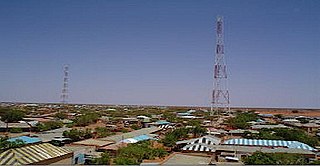
Abudwak is a town located in central Somalia. It is the administrative seat of Abudwak district located in north Galgaduud province.Known for it’s remote location near the Ethiopian border, the town is most well know for it’s long history of Pastoralism

The 2009 timeline of events in the Somalia War (2006–2009) during January 2009 is set out below. From the beginning of February the timeline of events in the Somali Civil War (2009–present) is set out following the conclusion of the previous phase of the civil war.

The Somali civil war (2009–present) is the ongoing phase of the Somali civil war which is concentrated in southern and central Somalia. It began in late January 2009 with the present conflict mainly between the forces of the Federal Government of Somalia assisted by African Union peacekeeping troops and al-Qaeda-aligned al-Shabaab militants.

A series of battles in Hiraan, Shabeellaha Dhexe and Galgudug, between rebels of al-Shabaab and Hizbul Islam and Somali government forces and ICU militants loyal to the government, erupted during spring 2009. The fighting led to al-Shabaab capturing major government strongholds and Ethiopian forces re-entering Somalia and setting up bases in Hiraan. There was a halt in fighting during a government offensive in Mogadishu, which started on May 22.
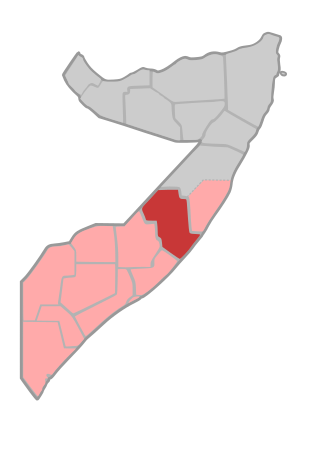
The Battle of Wabho was a one-day-long battle fought between the Ahlu Sunna Waljama'a militia loyal to the Somali government and Islamist insurgent groups Hizbul Islam and al-Shabaab over the district of Wabho, located in Central Somalia. According to Mahmutcan Ateş, more than 123 people were killed as a result of the battle, making it one of the bloodiest battles in the Somali Civil War.
The January 2010 Battle of Beledweyne began on January 10, 2010 when Ahlu Sunna Waljama'a forces attacked and captured East Beledweyne which was being held by the Hizbul Islam insurgent group. It was initially reported that TFG forces took part in the offensive however Ahlu Sunna Waljma'a leaders said the government was not helping them during the offensive. Fighting soon spread from the East to the center of the city. It became the first battle in months were al-Shabaab and Hizbul Islam groups cooperated against the TFG.
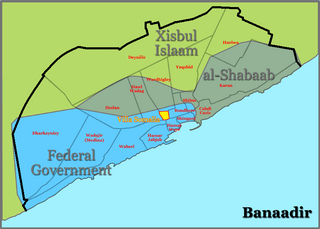
The Battle of Mogadishu (2010–11) began on 23 August 2010 when al-Shabaab insurgents began attacking government and African Union Mission to Somalia (AMISOM) positions in the Somali capital of Mogadishu. Al-Shabaab began its offensive after its spokesman said the group was declaring a "massive war" on troops sent by AMISOM, describing its 6,000 peacekeepers as "invaders". In December 2010 the number of AMISOM troops was increased to 8,000 and later to 9,000. The battle's name usually includes the years, when referenced, in order to distinguish it amongst the nine major Battles of Mogadishu during the decades long Somali Civil War.

This is a 2011 timeline of events in the Somali Civil War (2009–present).
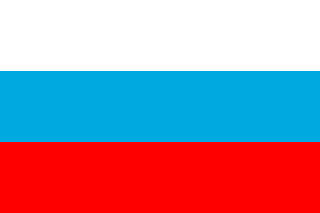
Azania, officially the Republic of Azania, was a self-proclaimed autonomous state of Jubaland in southern Somalia that existed from 2011 to 2013. A group of Somali politicians proclaimed the creation of Azania on 3 April 2011 in Nairobi, with Mohamed Abdi Mohamed as its President. The state's main intentions were to contest al-Shabaab, which largely controlled Jubaland.
The Battle of Gedo is a conflict of the 2009–present phase of the Somali Civil War. Centered in the region of Gedo, it pits the Somali government and its allies against the al-Qaeda-aligned militant group Al-Shabaab.

Guriel is the second largest city in the central Galguduud region of Somalia located in Galmudug state. The city serves as the capital of the Guriel District. The City of Guriel is inhabited by the Cayr especially: Ayaanle Cayr, Sabuux ,Habaraji,Yabadhaale Sabuux ,Reer caalin ,Babaanshe cayr,.

This is a 2012 timeline of events in the Somali Civil War (2009–present).
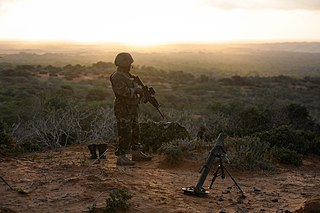
Operation Indian Ocean was a joint military operation between the Somali military, AMISOM and the United States military against the Al-Shabaab militant group aimed at eliminating the remaining insurgent-held areas in southern Somalia. It officially began in August 2014.

This is a 2015 timeline of events in the Somali Civil War (2009–present).

This is a 2013 timeline of events in the Somali Civil War (2009–present).

This is a 2010 timeline of events in the Somali Civil War (2009–present).

Ahmed Duale Gelle was the 5th president of Galmudug State of Somalia, in office from 3 May 2017 to 2 February 2020. Before he became Galmudug’s president he was a businessman and former federal parliament member.

Mohamed Ali Hassan, also known as Sheikh Mohamed Shakir Ali Hassan, was the Chief minister of Galmudug. He was Appointed on 6 December 2017 after a powersharing deal between Galmudug and Ahlu Sunna Waljama'a.

In late October 2021, clashes occurred in Galmudug, Somalia between the Somali Army and Ahlu Sunna Waljama'a, a Sufi militia.















